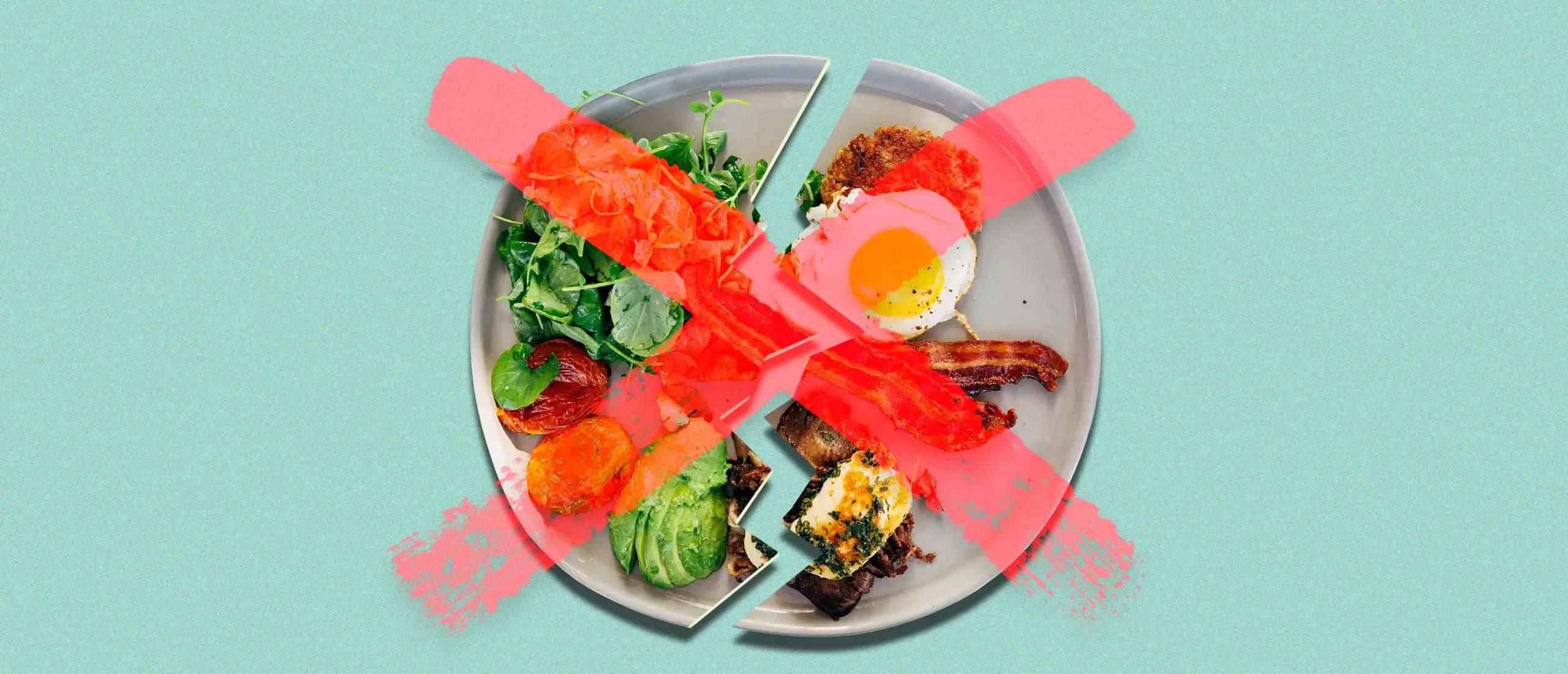I’m a Cardiologist. This Is What People Get Wrong About Keto
- By Sydney Bueckert, NASM C.P.T., C.E.S., F.N.S., G.P.T.S.
- January 9, 2024
The potential benefits of the keto diet are enticing. Studies show the keto diet might help improve testosterone levels, manage blood sugar levels, and boost weight loss (1, 2, 3). Perhaps the greatest benefit of going keto is its potential to make you more metabolically flexible—the ability for your body to switch between using carbs or fat for fuel on a dime (4).
But according to cardiologist, Dr. Steven Gundry, M.D., the keto diet isn’t very healthy. In his book, Unlocking the Keto Code, Gundry explains that because a traditional keto diet doesn’t limit saturated fat, it increases LDL cholesterol (5). By limiting carbs the keto diet also cuts back on plant nutrients like antioxidants and fiber that are essential for health (6, 7). It’s also restrictive, which makes it hard to stick to long-term.
Per Gundry, the widely accepted explanation for why keto works—by making us more efficient at producing fuel—is also wrong. There’s an easier, more effective, and less restrictive way to get the benefits of keto (including weight loss). Here’s the scoop.
How to get the most out of keto? Gundry explains exactly how and when to eat to boost weight loss, metabolic health, gut health, and more on the Hone In podcast.
Where the Traditional Keto Diet Went Wrong
Quick refresher: When you drastically reduce your carbohydrate intake, your body shifts to a unique metabolic state called ketosis where it switches to burning fat for fuel, releasing fat-burning compounds called ketones in the process. Ketones have been touted as “miracle fuel” by keto dieters. Some even go out of their way to supplement with exogenous ketones (drinks or supplements packed with ketones).
However, according to Gundry, ketones actually aren’t a great source of fuel. The real power of ketones is that they act as a signaling molecule for mitochondrial uncoupling—a mechanism that serves to protect your mitochondria when fuel is low.
Poor mitochondrial function is linked to heart disease, dementia, type 2 diabetes, metabolic syndrome, cancer, and insulin resistance (8, 9, 10, 11, 12, 13). “The more you allow [mitochondrial uncoupling] to a point, the healthier you become, the longer you live, and the better off your mitochondria are (14),” he adds.
What about weight loss? Gundry points back to mitochondrial uncoupling. While the science is relatively new, studies point to the promising effects of mitochondrial uncoupling for increasing basal metabolic rate (BMR) or the calories you burn at rest (15). A recent study found that supplementing with the mitochondrial uncoupler BAM15 reversed diet-induced obesity and insulin resistance in mice (16).
The Easier Way to Get Keto Benefits
Ketones are just one of many ways to tap into mitochondrial uncoupling. “You don’t need a high-fat, low-carb diet to get the benefits that ketones can provide,” he explains. Here are a few easier ways Gundry suggests for tapping into this powerful process.
Eat more polyphenols
Polyphenols are powerful antioxidant compounds naturally found in berries, olive oil, red wine, dark chocolate, and spices. “Paper after paper show polyphenols can support your body’s natural ability to protect your cells from oxidation, by encouraging mitochondrial uncoupling (17, 18),” says Gundry.
Try time-restricted eating
“If we have metabolic flexibility, we’ll start making ketones about twelve hours after our last meal. And those ketones send a signal to uncouple mitochondria (19),” says Gundry. To increase that signal, Gundry recommends time-restricted eating, or eating all your food within a specific time block of the day, and more importantly, not eating for a block of time each day.
How long do you need to fast? “In general, the longer that ketone signal occurs in a 24-hour cycle, then the better you’re going to do,” says Gundry. He suggests an 18:6 intermittent fast—meaning fasting for eighteen hours and eating for six—for best results.
Supplement MCTs
“If you want to induce ketones easily, MCT oil works really well,” says Gundry. In fact, since MCT oil is directly converted to ketones in your liver, you don’t even have to be in ketosis (or following a keto diet) to get the benefits. Although, one review suggests only certain types (C8 and C10) and amounts (starting with 5g and working up to 15 to 20g) of MCT oil are effective at inducing this effect (20).
Gundry points out that MCT oil can cause nausea and loose bowels in some people. For this reason, he recommends starting with a scoop of MCT coffee creamer or powder before switching over to oil.
Those with a heart or liver condition, diabetes, and pregnant or breastfeeding women should not take MCT oil as a supplement. As always, consult your healthcare provider before adding MCT oil to your diet, especially if you have any health conditions or are on any medication.
References
1. Wilson, J. et al. (2020). Effects of Ketogenic Dieting on Body Composition, Strength, Power, and Hormonal Profiles in Resistance Training Men.
2. Choi, Y. et al. (2020). Impact of a Ketogenic Diet on Metabolic Parameters in Patients with Obesity or Overweight and With or Without Type 2 Diabetes: A Meta-Analysis of Randomized Controlled Trials.
3. Roekenes, J. et al. (2021). Ketogenic Diets and Appetite Regulation.
4. Palmer, B. et al. (2022). Metabolic Flexibility and Its Impact on Health Outcomes.
4. Palmer, B. et al. (2022). Metabolic Flexibility and Its Impact on Health Outcomes.
5. Ruuth, M. et al. (2021). Overfeeding Saturated Fat Increases LDL (Low-Density Lipoprotein) Aggregation Susceptibility While Overfeeding Unsaturated Fat Decreases Proteoglycan-Binding of Lipoproteins.
6. Aune, D. et al. (2018). Dietary Intake and Blood Concentrations of Antioxidants and the Risk of Cardiovascular Disease, Total Cancer, and All-Cause Mortality: A Systematic Review and Dose-Response Meta-Analysis of Prospective Studies.
7. Ramezani, F. et al. (2023). Dietary Fiber Intake and All-Cause and Cause-Specific Mortality: An Updated Systematic Review and Meta-Analysis of Prospective Cohort Studies.
8. Poznyak, A. et al. (2020). The Role of Mitochondria in Cardiovascular Diseases.
9. Misrani, A. et al. (2021). Mitochondrial Dysfunction and Oxidative Stress in Alzheimer’s Disease.
10. Pinti, M. et al. (2019). Mitochondrial Dysfunction in Type 2 Diabetes Mellitus: An Organ-Based Analysis.
11. Bhatti, J. et al. (2017). Mitochondrial Dysfunction and Oxidative Stress in Metabolic Parameters—A Step Towards Mitochondria Based Therapeutic Strategies.
12. Luo, Y. et al. (2020). The Significance of Mitochondrial Dysfunction in Cancer.
13. Sergi, D et al. (2019). Mitochondrial (Dys)function and Insulin Resistance: From Pathophysiological Molecular Mechanisms to the Impact of Diet.
14. Demine, S. et al. (2019). Mitochondrial Uncoupling: A Key Controller of Biological Processes in Physiology and Diseases.
15. Ocloo, A. et al. (2012). Mitochondria as Pharmacological Targets: The Discovery of Novel Anti-Obesity Mitochondrial Uncouplers from Africa’s Medicinal Plants.
16. Alexopoulos, S. et al. (2020). Mitochondrial Uncoupler BAM15 Reverses Diet-Induced Obesity and Insulin Resistance in Mice.
17. Stevens, J. et al. (2018). Mitochondria-Centric Review of Polyphenol of Bioactivity in Cancer Models.
18. Wood dos Santos, T. et al. (2018). Effects of Polyphenols on Thermogenesis and Mitochondrial Biogenesis.
19. Ghimire, P. et al. (2023). Ketoacidosis.
20. Lin, T. et al. (2021). The Ketogenic Effect of Medium-Chain Triglycerides.











